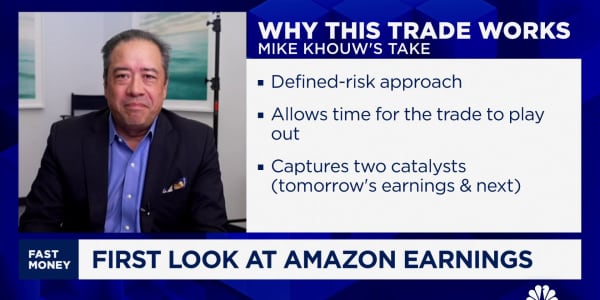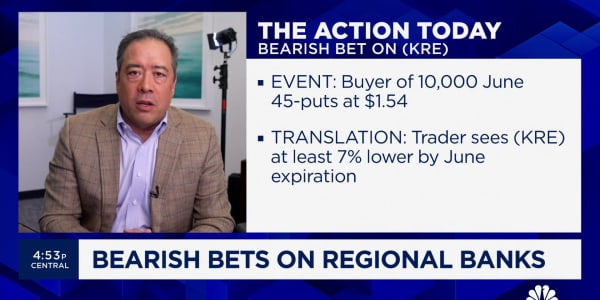
Could purgatory be the new paradise for Wall Street? For one group of investors, the answer is yes.
While the has surged more than 10 percent from its February low, a number of the index's components are trading at the midpoint between their 52-week low and 52-week high. Moreover, despite big moves up and down, the Dow is effectively flat for the past 16 months. But that sideways action has created a perfect environment for one strategy.
On CNBC's "Options Action" Friday, explained a trade structure which is referred to as selling a "strangle." The strategy, which typically is used in conjunction with a long equity position, is basically a bet that a stock will stay range bound for a particular span of time.
"The first thing you want to do is look for a stock that is stuck in a range," said Khouw. "The other thing because you are selling options you are looking to do that in a relatively short time frame. Usually I like to look for options that expire in 90 days or less," he added. "The last thing is you want to collect yields that are going to pay us for the risk we are taking."
Specifically, a trader will sell an out-of-the-money call and put of the same expiration. By selling that call, a trader risks having his stock called away at that call's strike price, and alternatively, by selling that put, the trader runs the risk of having to buy more stock at that put's strike prices. However, in exchange for taking those risks, the trader gets to pocket the price of the options that he or she sold. Ideally, a trader wants those options to expire, thus rendering a small profit.
Read More S&P 500 could rally, but risks still abound: Analysts
As an example, Khouw pointed to selling a "strangle" in Caterpillar. The stock is currently trading just under $73, roughly 23 percent lower than its May 2015 high and 29 percent higher than its January 2016 low.
"Caterpillar has had a sharp rebound along with a number of other commodity-driven names," said Khouw, founder of Optimize Advisors and a CNBC aontributor. "The thing is, it hasn't come far enough to revive that super-commodity stock."
The specific strangle that Khouw recommended was selling the April 77.50-strike call for 70 cents, and selling the 67.50-strike put for 85 cents. This trade sees profits if the stock stays above $72.80 and profits are protected if it falls between $72.80 and $71.25.






